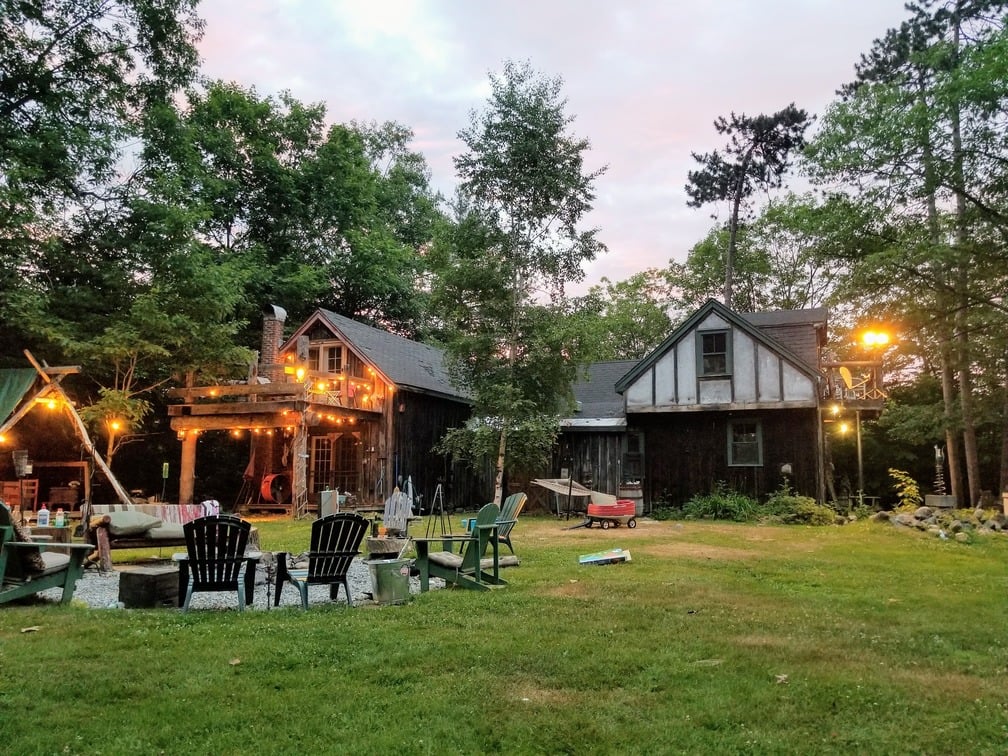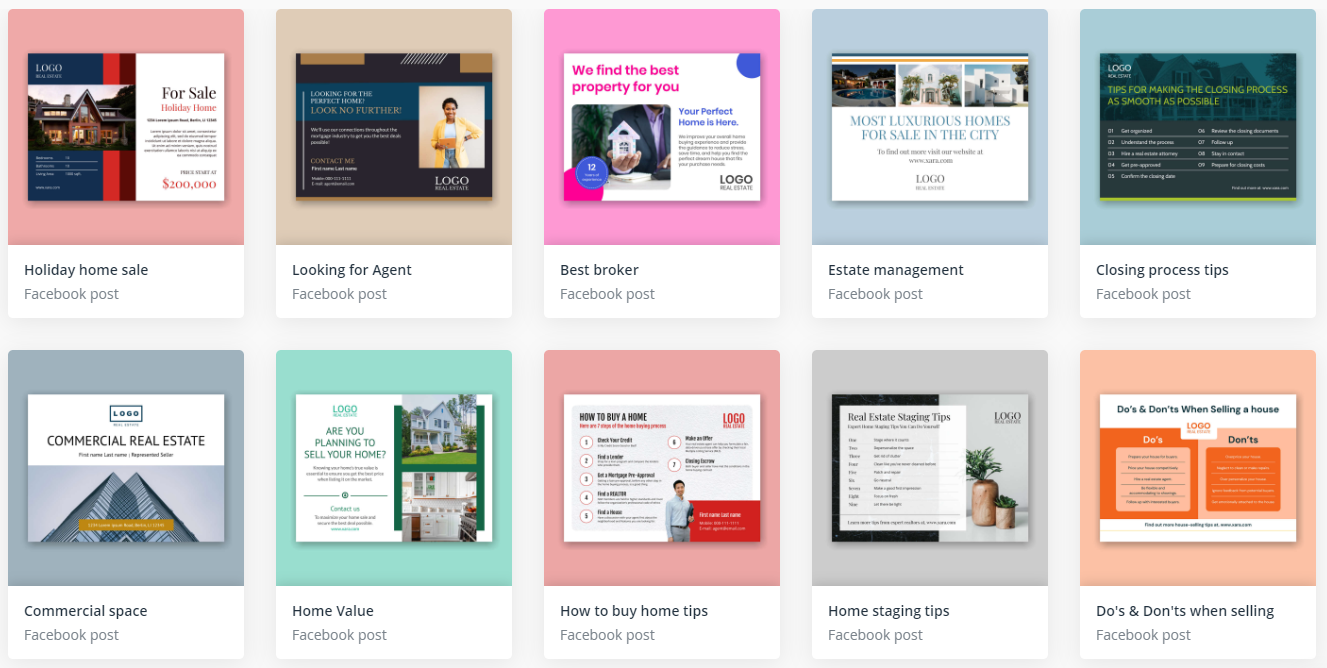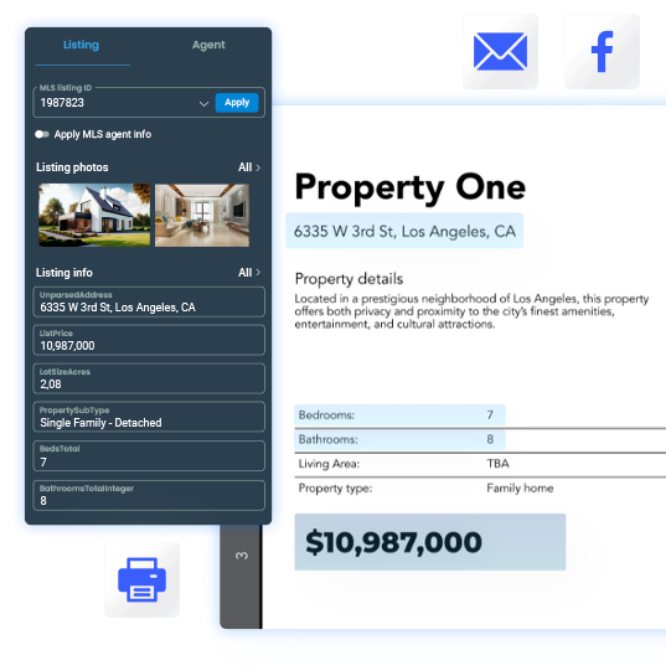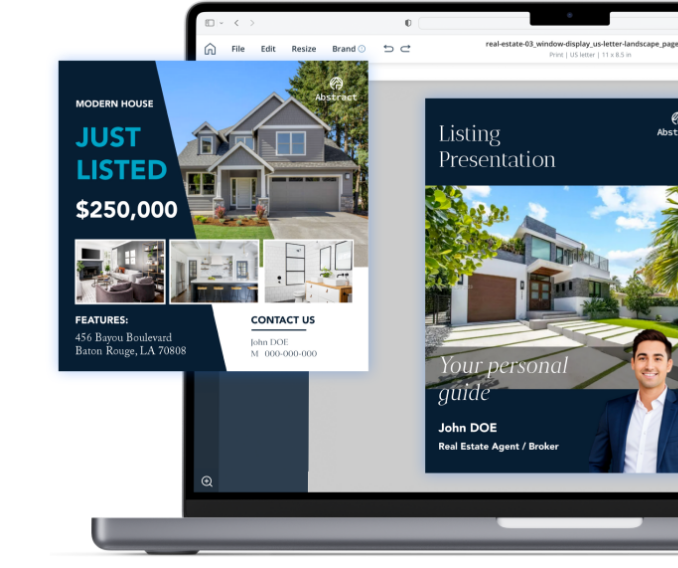As a real estate agent, you have much on your plate daily. From keeping up with the competition to navigating volatile markets, a lot is happening in the background of this job.
Yet, one aspect remains constant: you need clients to keep your business running.
You can build a loyal client base with the right real estate strategy and generate steady revenue streams.
But what does this strategy actually entail? The answer is simple: real estate farming.
Real estate agents are missing local opportunities by focusing on far-away markets.
Luckily, you don’t have to be one of them. After reading this article, you’ll know how to build a thriving real estate business in your area.
Let’s explore 11 ways to harness real estate farming and win over local clients without further ado!
What Is Real Estate Farming?
 Source
SourceReal estate farming is a marketing strategy agents use to establish themselves as the go-to expert in their region. Estate farming involves focusing on a specific neighborhood in your geographic area.
The key is to build relationships and capture leads in a specific area. With a solid farming strategy, you can generate leads close by instead of reaching for less-accessible markets.
A solid lead generation strategy in your farm area will ensure that you close those deals too.
Real estate farming must be a fundamental part of your marketing efforts as a real estate agent.
Other tactics to add to your real estate business strategy include:
- Establishing a presence on social media
- Promoting yourself through online advertising
- Investing in valuable courses and certifications to boost reliability
- Participating in various events to enrich your network of influence
For a real estate agent, having a solid real estate farming strategy can be vital to their business. As such, we’ll focus on real estate farming while helping you improve your sales activity.
Why Is Real Estate Farming Important?
 Source
SourceReal estate farming can become more than another source of income. Many realtors count on real estate farming as an integral part of their turnover rate. You can build a loyal client base by becoming a local expert in a particular area.
With consistent efforts, you will earn recurrent income through word of mouth.
Real estate is a competitive field, and it can be challenging for buyers and sellers to find the perfect agent to work with. This is where the power of word of mouth comes in.
WOM is an efficient way to increase your reach in real estate farming without spending much money.
This type of marketing helps you network, earn people’s trust, and build a reliable status. Learning how to use word-of-mouth to build social proof and grow as a realtor in your area is crucial.
Another critical aspect of your strategy is demographic farming.
Here’s why a demographic breakdown of a particular neighborhood is essential:
- It can help you differentiate yourself from competitors in that particular community.
- It can help you target specific farm areas that hold potential for growth.
- You will gain a deep understanding of the local market. This includes learning about local market trends, housing inventory, and pricing. Such metrics can prove to be invaluable when it comes to advising clients on the best course of action.
- It will turn you into a local expert, and you’ll get great reviews from your neighborhood residents. On top of that, you’ll get a thriving social life, recurring income, and built-in expertise in the farm area.
Now, let’s discuss how to explore your real estate farm area.
Understanding Your Local Real Estate Farming Area & Market
 Source
SourceUnderstanding your farming area is crucial if you’re looking to begin real estate farming.
Hands-on knowledge can help you make informed decisions and set realistic expectations. It will help you assess aspects like pricing and timing, which is essential in negotiations. Being up-to-date on the latest data can help you spot opportunities and avoid pitfalls.
Research Your Real Estate Farm Area
In real estate farming, everything revolves around opportunities to buy or sell locally.
So, researching your real estate farm area is critical in determining how you will do business.
A real estate farm area refers to a specific target area where you’ll focus your marketing efforts. Your farm area is where you’ll build a reputation to conduct business and brand yourself as an expert.
Thus, to begin your farming strategy, you’ll first need to determine the farm area. Only then you can start researching your key metrics. Some include your target audience, average sale price, upcoming events, etc.
Here’s how to research your real estate farm area:
- Do a quick online research. (look for market reports, homes sold or any valuable information about the farm area)
- Take a walk around the neighborhood. (Ex: explore local amenities such as schools, grocery stores, gyms, residential buildings, etc.)
- Get to know your community by asking questions. (You could try joining group activities or a local Facebook group and meeting up with people).
- Take an interest in community events and customs.
- Take part in public house showings. Conduct a couple of google searches to find out about the ones in your area and filter them by date.
Throughout your research, record key demographic factors about your audience such as:
- Age
- Marital status
- Occupation
- Income
- Other relevant data (number of dependents, relocation perspectives, etc.)
This type of data will aid you in gaining a deeper understanding of demographic farming. Moreover, it will help you provide the best experience for them and tailor your service.
Research is key to understanding your farming area and identifying potential opportunities. After you know your region’s real estate farming game, you can start monitoring the legal aspects.
Familiarize Yourself with Local Real Estate Market Regulations
 Source
SourceIn real estate farming, you must familiarize yourself with local regulations.
Here are some ideas to help you get started with researching your real estate farm area’s legal bindings:
- Research regulations from local sources and check with local municipalities
- Talk to other local real estate agents
- Attend seminars and join real estate organizations
- Read local news and publications
Some things to look for in your research include the following:
- zoning laws
- property tax regulations
- licensing requirements.
Additionally, it’s important to stay up-to-date with local regulations. Laws and regulations usually impact real estate.
Staying on top of the legal aspect of real estate will ensure that you’re operating within the bounds of the law. Make sure to check the ethical guidelines of the National Association of Realtors.
11 Practices to Use In Your Real Estate Farming Area
By now, you should know what real estate farming is and how to research your farm area effectively. Now, it’s time to learn the right practices to build a successful business.
Here are 11 practices to start implementing in your real estate farming business:
1. Use Direct Mail Marketing in Your Neighborhood
 Source
SourceDirect mail marketing is an effective way to maximize your real estate business. Mailing potential sellers and buyers and offering them valuable information can help you in many ways.
Regarding real estate farming, staying in touch with your leads is crucial. They are often your neighbors, colleagues, or acquaintances. Thus, you must keep a close-knit relationship with them for many reasons.
To start, you’ll need a targeted mailing list. You can build one using public records or online marketing materials. You could try using an ebook that generates leads through a landing page.
Once you have your list, you can begin your real estate farming campaign. Start by sending out real estate promotional materials to introduce yourself and your services.
Here are some examples of real estate marketing materials that you can send:
- Postcards. (Create real estate farming postcards with actionable messages like: “Looking to sell your home?” or “Want to know your home’s value?”)
- Brochures. (Include brief stats about local prices and trends, best practices when buying or refurbishing homes, etc.)
- Newsletters. (Talk about monthly market updates, new listings, sold listings, local events, or other relevant materials)
- Home presentations. (Include virtual tours, progress pictures with unfinished apartments, etc.)
- Real estate listings. (You can sort them by price and publishing date to make it easier for your prospects to filter them)
Leverage this Unique Xpressdocs Integration to Save Hours of Local Farming Efforts
With our just-added seamless Xpressdoc integration, your real estate agents can now design, print, and distribute their farming materials from one dashboard.
Here’s how this integration streamlines your marketing efforts in three easy steps:
- You get to design all your marketing materials in Xara from unique templates that you can auto-populate with your brand guidelines, AI copy, and more.
- You can use the Xpressdocs integration to print and ship them on the same day on high-quality paper, juggling various formats and sizes.
- Using this integration, you can also distribute these materials to any area using zip codes. They’ll arrive in your target audience’s inbox straight ahead!
We understand the importance of time efficiency. That’s why our unique auto-populate feature allows your agents to create listing materials easily. No more manual data entry – let Xara handle it for you.
All in all, this powerful feature ensures that your materials are not only visually appealing but also up-to-date. The best part? It’s saving you valuable time and effort in the process!
2. Reach Out to Motivated Home Sellers Via Cold Calling
 Source
SourceCold calling, while not always the most popular marketing strategy, can be a practical lead-generation approach in a farm area.
You can establish personal connections with homeowners by reaching out directly to prospects. Thus, they will remember you if they want to sell their homes.
Here are some types of home sellers that you can reach out to in your farm area if you’re looking to generate leads:
- Empty Nesters: These are individuals whose children have grown up and moved out of the home. They may be looking to downsize or move to a different location.
- Job Relocators: Individuals relocating for work may need to sell their homes quickly. Hence, they may be more motivated to work with a real estate agent like yourself.
- Expired Listings: These homes were listed for sale but did not sell during the listing period. You can contact homeowners to see if they are still interested in selling and want to work with a new agent.
- Distressed Sellers: These are homeowners who are in a difficult financial situation. They may be looking to sell their homes quickly. In contrast, other buyers may want to upgrade to a larger property. These two categories are usually a good match.
- Successors: People who have just inherited a property and are looking to liquidate it.
Demographic farming means focusing on different types of home sellers in a farm area. This way, you can increase your chances of closing more deals by tailoring your approach.
3. Launch Targeted Ads in Your Real Estate Farming Area
 Source
SourceIf you have a good real estate farming idea and want to share it with your target audience, it may be time to invest in ads. Ads of all types are a great way to promote your ideas creatively and spark engagement in your market.
- To start with, you’ll need to define your target audience. It could be homeowners, homebuyers, local business owners, or anyone.
- Then, it’s time to create eye-catching ads using real estate templates.
- Lastly, use platforms like Google’s Ad Center (for Google ads) or Meta Business Suite (for social media ads).
Regarding real estate farming and a local audience, Facebook ads are a great option. They allow you to target people by location, interests, and demographics.
In addition, if you’ve got the budget, Google Ads will likely generate quick leads. That’s because Google is the number one search engine worldwide.
Yet, the best ad strategy for you largely depends on the size of your budget and your target market. A combination of Facebook and Google ads will be optimal if you’re looking for complete ad coverage.
Real estate ad marketing can include promotional materials like:
- Studies of successful listings, property tours, and neighborhood profiles
- Educational content (blog posts and videos)
- Case studies about the local real estate market
- Social media posts regarding available properties
Again, remember that your ads should address your audience’s specific needs and interests and bring forth consistent value. Achieve this by offering relevant information and helpful tips for the local real estate market.
4. Be a Neighborhood Resource in Your Real Estate Farming Area
 Source
SourceIn real estate farming, being a resource for your community is necessary. How else will they trust you enough with their real estate needs?
Here are some ideas to consider sharing within your farming area:
- Market updates
- Guides to buying and selling a home
- A local calendar with events and attractions
- Neighborhood guides
- Home improvement tips
- Real estate news
Once you assemble those valuable materials, it’s time to distribute them to your farm area. This can be done through direct mail or email or by collaborating with local businesses.
5. Get Creative with Door Knocking and Open Houses
 Source
SourceDoor knocking and open houses are two common methods in any lead generation strategy. Yet, there are ways to make them more effective and stand out from your competition.
Here are some tips for getting creative with door-knocking and open houses:
- Personalize your approach. When door-knocking, aim to establish a personal connection with each homeowner. Ask about their neighborhood, favorite local spots, or what they love about their home.
- Use technology to your advantage. Consider using a tablet or smartphone to show buyers virtual tours of homes for sale in the area.
- Create an experience. When hosting an open house, think about ways to make it a memorable experience for people. You could offer refreshments or use the fresh bread smell technique.
6. Collaborate With Local Businesses From Your Real Estate Farming Area
Partnering with local businesses can help you generate more leads and promote yourself. These types of collaboration are among the most lucrative deals you can get as a real estate agent.
Such deals take your real estate farming efforts a long way while helping other businesses thrive alongside yours.
Collaborating allows you to capitalize on each other’s market and grab a bigger slice of the pie. As a bonus, your customers will receive added benefits from both parties. Naturally, this will increase the likeliness of your joint success.
Here are some examples of collaborations that you can tie with local businesses:
- Leave business cards in a local coffee shop. In exchange, invite them to bring their beverage stand to a public showing.
- Offer a joint discount to all clients who choose to buy from both of you. (Ex: If they go through you to buy a house, they get a discount from a mattress shop).
- Cross-promote each other on social media or the website to grow a common audience. (Ex: You can tag each other in stories. You can also create a recommendation list and include them while they recommend you as an agent, etc.)
- Offer clients a lifetime discount at a local shop if they choose you as an agent.
Working with a local business may give you a better understanding of the local market. This way, you can better serve your clients and tailor your services to their needs.
By collaborating with a local business, you can ensure a mutually beneficial situation. Who doesn’t love a win-win situation?
7. Learn How to Harness FSBOs and Expired Listings
 Source
SourceIf you’re practicing real estate farming, you may seek ways to harness FSBOs (For Sale By Owner) and expired listings.
The first thing you want to do is look them up using the MLS (Multiple Listing Service). Then, reach out to prospects directly.
Additionally, you can track listings that will expire soon. Hence, you’ll be the first to contact them if they expire.
Reach out to prospects with a personal touch. When contacting FSBOs and expired listings, it’s essential to be respectful and non-intrusive. Start by sending a personalized letter or email, introducing yourself, and offering to help with any questions or concerns.
When reaching out, provide value by offering a free home valuation or market analysis. This will show that you know the local market and are willing to help.
8. Host Block Parties or Informal Events in Your Farming Area
 Source
SourceHosting block parties or personal events can be a great way to boost your real estate farming strategy. You will connect with residents and build relationships. Eventually, this will help you establish yourself as a trustworthy real estate professional in your farming area.
Thus, block parties and other informal events are a great way to connect with your neighbors and generate new leads.
However, focus on having a good time and allow people to enjoy the party rather than turning the event into a personal presentation.
If you want to get formal and host a seminar, you can rent a place or set up your own. This way, you can focus on offering added value for your leads in exchange for their contact info.
9. Attend Neighborhood and Local Events
Networking events are essential for real estate farming. They help you connect with people in your community and share ideas. Some good examples of events are workshops, game nights, and cultural meetings.
Thus, the more you attend these community events, the higher the chances of taking your farming efforts to the next level.
Successful realtors know they should always keep a few business cards with them. You never know where your next sold homes are coming from.
The key is consistently putting effort into your real estate farming ideas.
Whether attending events or sharing valuable ideas, you’ll generate leads quickly if you’re consistent.
10. Create a Local Community Group on Facebook
 Source
SourceA Facebook group can help you in more ways than you can imagine. You can connect with potential clients, share market updates and new listings, and establish yourself as an expert in the farming area.
Here are some ways to leverage a Facebook group and boost your real estate farming strategy:
- Share market updates
- Share new listings
- Share homes sold
- Talk about local news or upcoming events (Ex: a fundraiser, a local auction, an opening, etc.)
- Establish yourself as an expert by sharing valuable information
- Engage with people. You can respond to questions and comments in the group. In addition, you can post polls or other interactive content to generate engagement.
A Facebook group allows you to build a community around your brand. Besides, you can create a space for sellers, buyers, and other real estate professionals to connect.
The best part? Everything happens under your professional administration, so the information goes through you first.
11. Sponsor Local Events to Boost Your Reputation
Sponsoring local events is a great way to connect with potential clients in the farming area.
One popular type of event to sponsor is school fundraising events.
You can connect with parents and families by sponsoring a school fundraising event. In time, they could be interested in buying or selling a home and ask for your help.
Therefore, sponsoring events can be a valuable farming technique for niche marketing. For example, if you specialize in first-time homebuyers, you can donate to causes focused on home-buying education.
This is how you’ll grow your chances of succeeding in that market.
When funding events, it’s important to have a clear strategy in place. Moreover, try creating promotional materials such as brochures to distribute at the occasion.
Remember to build a clear plan for following up with attendees after the fact, such as sending a thank you email.
Becoming The Best Agent In Your Real Estate Farming Area Takes Time

Real estate farming is more than just marketing—it’s a way of doing business locally, and pays off. The key is to create a solid network and establish yourself as a thought leader in your area. People will soon know your name and come to you with their estate needs.
While you may not see immediate results from your farming techniques, becoming the go-to agent in your area will prove to be a high-paying status.
Besides, this strategy will only work if you’re willing to stay consistent in your farming efforts. When creating promotional materials, researching news, and displaying visual information, take your time.
At Xara, we know that good things take time. Since most of us don’t have too much of it, why not save as much as you can with FREE customizable templates?
Even better—you can create engaging visuals while working with your team using our collaboration tools.
Sign up for Xara Cloud today and start creating professional marketing materials to stand out in your farming area!
Start your Real Estate Farming Strategy with Xara Templates

Get Your Free Real Estate Marketing Materials For Your Business!
Join 10 000+ real estate agents powered by Xara Marketing Center.
- Sign up for a free account.
- Get a 14-day premium trial.
- No credit card required.








 No credit card or phone number required.
No credit card or phone number required.